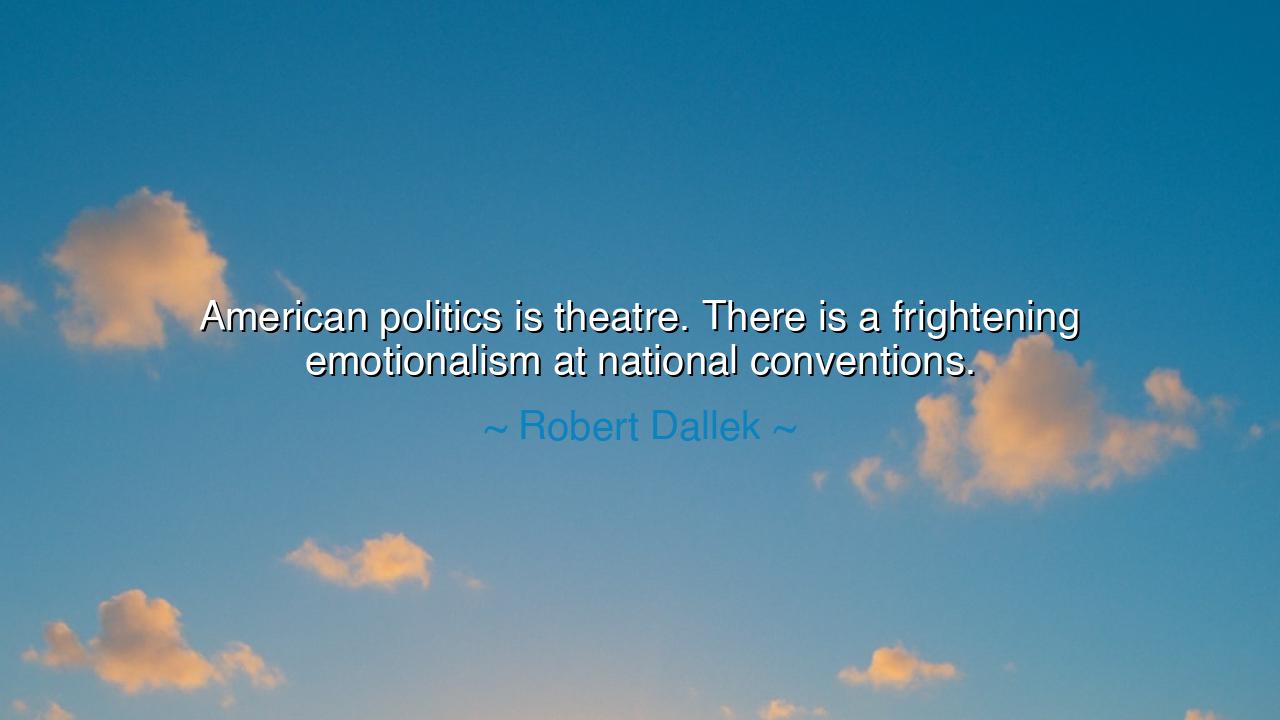
American politics is theatre. There is a frightening
American politics is theatre. There is a frightening emotionalism at national conventions.






Hear, O watchers of nations, the words of Robert Dallek, the chronicler of presidents and the shadows they cast: “American politics is theatre. There is a frightening emotionalism at national conventions.” In this utterance, he reveals that the realm of power is not only governed by reason, law, and policy, but also by performance, spectacle, and raw emotion. For in the gathering of the many, the mind often yields to the heart, and passion triumphs over calm judgment.
For indeed, politics is theatre. Leaders play their roles, not only as rulers but as actors upon a stage, reciting speeches crafted like scripts, surrounded by banners, music, and applause. The people, like an audience, are swept not only by the content of words but by their delivery, their fire, their rhythm. In the frenzy of national conventions, reason gives way to ritual, chants, and cheers, and the destiny of a nation is often sealed by emotion rather than deliberation.
History bears witness. In the 1968 Democratic National Convention in Chicago, the nation saw not unity but chaos—delegates shouting, police clashing with protestors outside, and the air thick with anger and fear. What should have been a meeting of governance became theatre of rage, its emotionalism frightening in its intensity. Dallek’s words capture this truth: that such gatherings, though meant to crown leaders, can reveal the instability that lies beneath democracy’s surface.
So too in the rise of charismatic leaders across ages. Consider the fiery speeches of Adolf Hitler in 1930s Germany—gatherings choreographed like performances, where masses were stirred not by reasoned argument but by orchestrated emotionalism. Here, politics as theatre became not mere spectacle but a weapon, leading nations into darkness. Thus, the danger is not in passion itself, but in its unchecked sway over judgment.
Therefore, let this wisdom endure: when politics becomes theatre, the stakes are no less than the fate of nations. Spectacle can inspire, but it can also deceive; emotion can unify, but it can also blind. Robert Dallek’s words ring as warning—that we must watch carefully when passion runs high, lest the curtain fall and reveal not democracy’s strength, but its vulnerability to illusion. For in politics, as upon the stage, the performance may move the heart, but it is the unseen consequences that shape the world.






DMTran Ngoc Diem My
Robert Dallek’s quote about American politics being theatre resonates with the way political events often seem more about spectacle than substance. The emotionalism that takes center stage at conventions seems to stir people’s passions, but does it lead to meaningful action? Could it be that focusing too much on emotional appeal is detracting from the real work of governance? How can we bring more substance back into the political process without losing the energy and engagement that emotions can bring?
NKLuong Nhan Khanh
I agree with Dallek’s assessment of American politics as theatre. The emotionalism at national conventions often feels scripted, like part of a show designed to evoke a response. Is this form of emotional engagement productive for democracy, or does it detract from the serious decision-making process? How much should the emotional aspect of politics be used to rally support, and when does it cross the line into manipulation?
ATPhuong Anh Trinh
The idea of American politics as theatre, as Dallek suggests, makes me think about the role of media in shaping political narratives. Is it possible that the emotionalism at national conventions is driven more by the media’s need for drama than the actual political process? Does this contribute to the polarization we see today, where emotions often cloud rational debate, and is it damaging to the democratic process?
YSYumeika Sujin
Dallek’s comment about the emotionalism at national conventions really highlights how politics often seems to be about appearances rather than substance. Does this theatrical aspect make people more engaged or simply more confused? How much of the emotional energy in politics is genuine, and how much is manufactured to sway public opinion? Can we ever expect political discourse to return to being focused on facts and policies, rather than emotions?
NAPham Ngoc An
Robert Dallek’s observation about American politics being a form of theatre is insightful. It speaks to the performative nature of politics, especially during national conventions, where emotions often seem exaggerated. Is this emotionalism an effective tool for rallying support, or does it obscure the real issues? Can politics, at its core, be separated from theatrics, or has it become inherently tied to spectacle and drama in modern times?